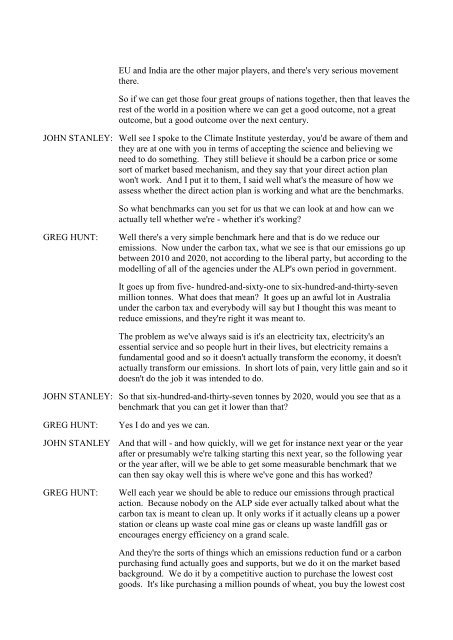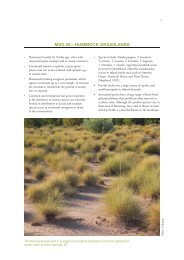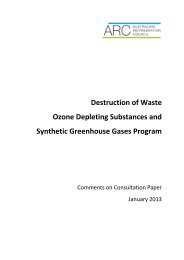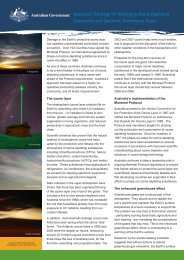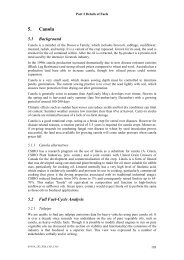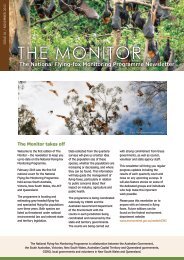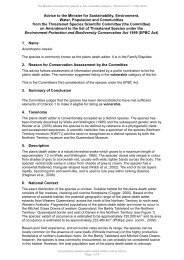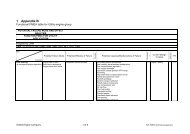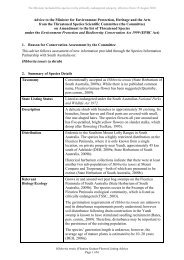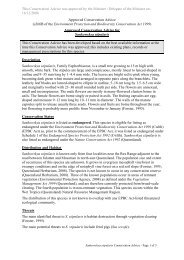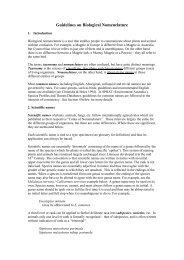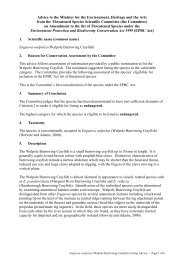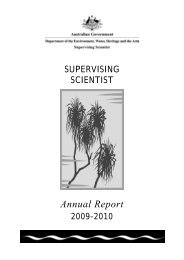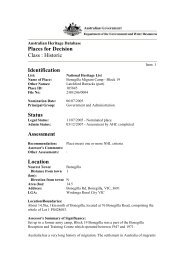Transcript: Interview with John Stanley (PDF - 184 KB)
Transcript: Interview with John Stanley (PDF - 184 KB)
Transcript: Interview with John Stanley (PDF - 184 KB)
You also want an ePaper? Increase the reach of your titles
YUMPU automatically turns print PDFs into web optimized ePapers that Google loves.
EU and India are the other major players, and there's very serious movement<br />
there.<br />
So if we can get those four great groups of nations together, then that leaves the<br />
rest of the world in a position where we can get a good outcome, not a great<br />
outcome, but a good outcome over the next century.<br />
JOHN STANLEY: Well see I spoke to the Climate Institute yesterday, you'd be aware of them and<br />
they are at one <strong>with</strong> you in terms of accepting the science and believing we<br />
need to do something. They still believe it should be a carbon price or some<br />
sort of market based mechanism, and they say that your direct action plan<br />
won't work. And I put it to them, I said well what's the measure of how we<br />
assess whether the direct action plan is working and what are the benchmarks.<br />
So what benchmarks can you set for us that we can look at and how can we<br />
actually tell whether we're - whether it's working?<br />
GREG HUNT:<br />
Well there's a very simple benchmark here and that is do we reduce our<br />
emissions. Now under the carbon tax, what we see is that our emissions go up<br />
between 2010 and 2020, not according to the liberal party, but according to the<br />
modelling of all of the agencies under the ALP's own period in government.<br />
It goes up from five- hundred-and-sixty-one to six-hundred-and-thirty-seven<br />
million tonnes. What does that mean? It goes up an awful lot in Australia<br />
under the carbon tax and everybody will say but I thought this was meant to<br />
reduce emissions, and they're right it was meant to.<br />
The problem as we've always said is it's an electricity tax, electricity's an<br />
essential service and so people hurt in their lives, but electricity remains a<br />
fundamental good and so it doesn't actually transform the economy, it doesn't<br />
actually transform our emissions. In short lots of pain, very little gain and so it<br />
doesn't do the job it was intended to do.<br />
JOHN STANLEY: So that six-hundred-and-thirty-seven tonnes by 2020, would you see that as a<br />
benchmark that you can get it lower than that?<br />
GREG HUNT:<br />
Yes I do and yes we can.<br />
JOHN STANLEY And that will - and how quickly, will we get for instance next year or the year<br />
after or presumably we're talking starting this next year, so the following year<br />
or the year after, will we be able to get some measurable benchmark that we<br />
can then say okay well this is where we've gone and this has worked?<br />
GREG HUNT:<br />
Well each year we should be able to reduce our emissions through practical<br />
action. Because nobody on the ALP side ever actually talked about what the<br />
carbon tax is meant to clean up. It only works if it actually cleans up a power<br />
station or cleans up waste coal mine gas or cleans up waste landfill gas or<br />
encourages energy efficiency on a grand scale.<br />
And they're the sorts of things which an emissions reduction fund or a carbon<br />
purchasing fund actually goes and supports, but we do it on the market based<br />
background. We do it by a competitive auction to purchase the lowest cost<br />
goods. It's like purchasing a million pounds of wheat, you buy the lowest cost


